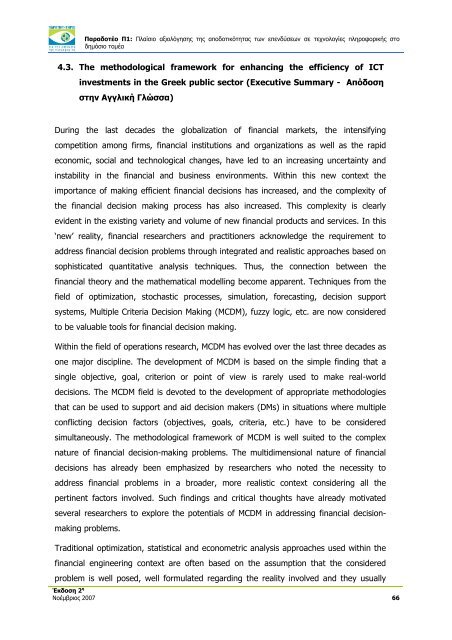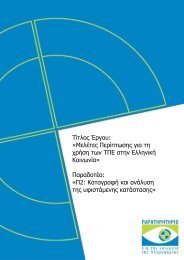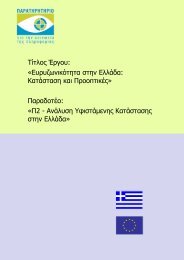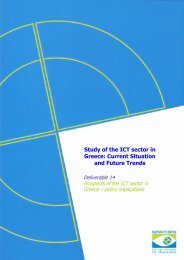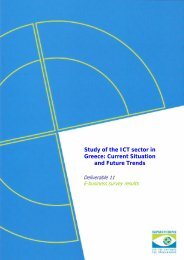ΠλαίÏιο αξιολÏγηÏÎ·Ï ÏÎ·Ï Î±ÏοδοÏικÏÏηÏÎ±Ï ÏÏν εÏενδÏÏεÏν Ïε ...
ΠλαίÏιο αξιολÏγηÏÎ·Ï ÏÎ·Ï Î±ÏοδοÏικÏÏηÏÎ±Ï ÏÏν εÏενδÏÏεÏν Ïε ...
ΠλαίÏιο αξιολÏγηÏÎ·Ï ÏÎ·Ï Î±ÏοδοÏικÏÏηÏÎ±Ï ÏÏν εÏενδÏÏεÏν Ïε ...
Create successful ePaper yourself
Turn your PDF publications into a flip-book with our unique Google optimized e-Paper software.
Παραδοτέο Π1: Πλαίσιο αξιολόγησης της αποδοτικότητας των επενδύσεων σε τεχνολογίες πληροφορικής στο<br />
δημόσιο τομέα<br />
4.3. The methodological framework for enhancing the efficiency of ICT<br />
investments in the Greek public sector (Executive Summary - Απόδοση<br />
στην Αγγλική Γλώσσα)<br />
During the last decades the globalization of financial markets, the intensifying<br />
competition among firms, financial institutions and organizations as well as the rapid<br />
economic, social and technological changes, have led to an increasing uncertainty and<br />
instability in the financial and business environments. Within this new context the<br />
importance of making efficient financial decisions has increased, and the complexity of<br />
the financial decision making process has also increased. This complexity is clearly<br />
evident in the existing variety and volume of new financial products and services. In this<br />
‘new’ reality, financial researchers and practitioners acknowledge the requirement to<br />
address financial decision problems through integrated and realistic approaches based on<br />
sophisticated quantitative analysis techniques. Thus, the connection between the<br />
financial theory and the mathematical modelling become apparent. Techniques from the<br />
field of optimization, stochastic processes, simulation, forecasting, decision support<br />
systems, Multiple Criteria Decision Making (MCDM), fuzzy logic, etc. are now considered<br />
to be valuable tools for financial decision making.<br />
Within the field of operations research, MCDM has evolved over the last three decades as<br />
one major discipline. The development of MCDM is based on the simple finding that a<br />
single objective, goal, criterion or point of view is rarely used to make real-world<br />
decisions. The MCDM field is devoted to the development of appropriate methodologies<br />
that can be used to support and aid decision makers (DMs) in situations where multiple<br />
conflicting decision factors (objectives, goals, criteria, etc.) have to be considered<br />
simultaneously. The methodological framework of MCDM is well suited to the complex<br />
nature of financial decision-making problems. The multidimensional nature of financial<br />
decisions has already been emphasized by researchers who noted the necessity to<br />
address financial problems in a broader, more realistic context considering all the<br />
pertinent factors involved. Such findings and critical thoughts have already motivated<br />
several researchers to explore the potentials of MCDM in addressing financial decisionmaking<br />
problems.<br />
Traditional optimization, statistical and econometric analysis approaches used within the<br />
financial engineering context are often based on the assumption that the considered<br />
problem is well posed, well formulated regarding the reality involved and they usually<br />
Έκδοση 2 η<br />
Νοέμβριος 2007 66


